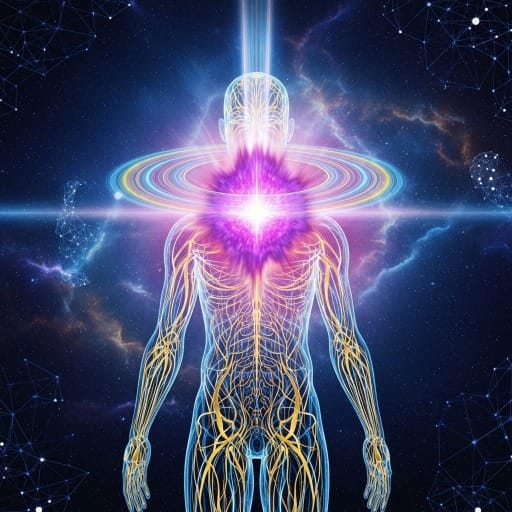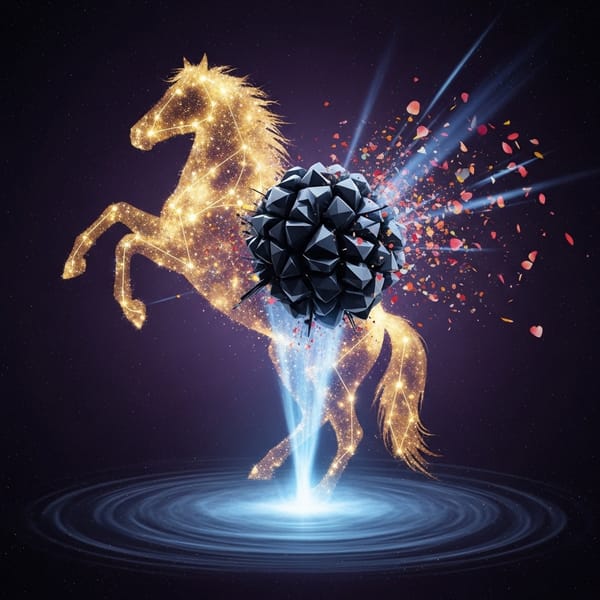Do not seek to follow in the footsteps of the ancient ones; seek what they sought.
Don't just follow in the footsteps of the ancients; seek what they sought. This guide reframes the pursuit of wisdom as a personal quest, not mere imitation. Learn to embody their spirit of inquiry, connect with universal truths, and forge your own authentic path to a more fulfilling life.

Key Takeaways
- This article emphasizes exploring Ancient Wisdom rather than imitating past figures, encouraging a personal quest for understanding.
- It promotes a holistic approach to learning by connecting philosophy, art, and science as unified practices.
- The author suggests practical methods for applying Ancient Wisdom, including seeking deeper meaning and cultivating mindfulness.
- Engaging with Ancient Wisdom can lead to personal transformation and a profound sense of interconnectedness with the universe.
- The article concludes with a call to action: embark on a 30-Day Seeker's Challenge to actively pursue your unique path.
🔑7 Ways to Unlock Ancient Wisdom for a More Fulfilling Life
Have you ever gazed upon the accomplishments of ancient philosophers, artists, and scientists and felt a mix of awe and intimidation? Their ancient wisdom captivates us, yet it's a familiar feeling in our age of information overload. We have access to all their works, yet we often feel more scattered than wise. We admire their brilliance, but it's easy to fall into the trap of trying to replicate their exact footsteps instead of seeking what truly drove them.
In this blog post, we'll explore the profound wisdom of the age-old adage, "Do not seek to follow in the footsteps of the ancient ones; seek what they sought." We'll delve into its holistic and metaphysical implications, providing practical insights on how you can apply this wisdom not just to improve your life, but to change the very lens through which you see it. This is about finding your own North Star, not just following an ancient map.
🔎Understanding the Essence of Seeking
The quote challenges us to look beyond superficial imitation and delve into the core motivations and aspirations of those who came before us. It's not about mimicking their actions but about understanding and embodying the spirit behind their pursuits.
Think of it like this: Following in their footsteps is like meticulously following an ancient recipe. You might end up with a similar-tasting dish, but you won't understand why it works. Seeking what they sought is akin to learning the principles of flavor, heat, and chemistry from a master chef. You can then walk into any kitchen, with any ingredients, and create something nourishing and new that is authentically your own. One is imitation, the other is creation.
🧘The Holistic Approach to Ancient Wisdom
This wisdom encourages a holistic approach to learning and growth, one that enriches every part of our being. The ancients rarely saw philosophy, art, and science as separate domains; they were interwoven methods of exploring reality. Seeking what they sought means we must also adopt a unified approach.
- A Dialogue with History, Not a Monologue: We are invited into a living dialogue across millennia. Instead of just studying ancient wisdom, we can engage with it. We can ask Marcus Aurelius not just "What did you write?" but "How can your principles on controlling perception apply to my world of social media and 24/7 news?" We can ask Plato not just "What is justice?" but "How can I be a better citizen in my community when we are so divided?" We can ask Rumi not "What is love?" but "How can I open my own heart after it has been broken?" This approach avoids the cynical dismissal of the past as irrelevant and the blind romanticization of it as perfect. The dialogue changes you, forcing you to clarify your values against the greatest minds in history as you become an active participant in the ongoing evolution of wisdom.
- From Information to Embodiment: Following footsteps is about collecting information and facts about what others have done. Seeking what they sought is about the process of embodiment. It's the difference between knowing the path and walking it. Embodiment is when wisdom drops from your head into your bones. It’s the moment a philosophical concept is no longer a quote you recall, but the reason you stay calm in traffic, show compassion to a difficult colleague, or choose courage over comfort. This is the inner alchemy of true wisdom: turning the lead of abstract knowledge into the gold of a transformed character. The goal isn’t to have a library of concepts in your head, but to have your very presence become a testament to the wisdom you’ve absorbed.
- Personal Transformation Through a United Self: Seeking what the ancients sought leads to profound personal transformation. It requires us to engage our whole selves—the intellectual curiosity of the head (the 'What' and 'Why'), the intuitive and compassionate capacity of the heart (the 'For Whom' and 'With What Feeling'), and the practical application and testing of the hands (the 'How' and 'When'). When the head, heart, and hands work in unison, our search is prevented from becoming sterile and abstract, ensuring it enriches our mind, our relationships, and our actions in the world.
🌌Metaphysical Implications
The metaphysical aspects of this statement are profound, inviting us to look beyond the surface of everyday life.
- Transcendence of Time and Space: Think of the last time you were moved by a piece of music, a work of art, or a stunning sunset. In that moment of awe, your sense of 'you'—your worries, your to-do list, your place in history—faded. You were connected to something bigger. This is a taste of what the ancients sought. This concept is rooted in the idea of the Perennial Philosophy—the notion that a single, universal "golden thread" of truth underlies all great spiritual and philosophical traditions. The ultimate truths sought by the ancients transcend their specific time and place because they are not products of culture, but fundamental aspects of reality itself. By seeking them ourselves, we are tapping into this same timeless, non-local field of awareness.
- The Nature of Reality: This adage suggests a deeper understanding of reality that extends beyond the physical world. It encourages us to shift our investigation from the shadows on the cave wall to the light that casts them. In today's world, the 'shadows on the cave wall' might be our social media feeds, the 24-hour news cycle, or the fleeting metrics of success we chase. Seeking what they sought means turning away from these flickering shadows to ask: What is the source of the light? The ancients questioned not just the "what" of existence, but the "is-ness" itself. Is consciousness primary? Is the universe a product of the mind? These are the questions that move us beyond physics and into metaphysics, exploring the very ground of being.
- Interconnectedness as Microcosm and Macrocosm: This reflects the ancient principle of "as above, so below," which is akin to saying that a single drop of seawater contains the essence of the entire ocean. The ancients believed the same of us: the whole universe isn't just 'out there'; its patterns, principles, and mysteries are encoded 'in here.' To understand the nature of creation, they studied their consciousness. To understand universal laws of harmony and discord, they observed their own emotions and relationships. The path to knowing the universe, they proposed, runs directly through the self.
🧰7 Practical Ways to Apply Ancient Wisdom
- Seek the 'Why' Behind the 'What': Instead of blindly following traditions, seek understanding through deep questioning and reflection.
- Become Your Own Laboratory: Engage in experiential learning and allow yourself to discover your truths.
- Follow the Thread of Awe: Nurture a sense of wonder and curiosity about the fundamental questions of existence.
- Translate, Don't Just Transcribe: Recognize the value of ancient wisdom while adapting it to your current context and personal experiences.
- Adopt a Perpetual Beginner's Mind: Pursue spiritual and philosophical growth as a continuous journey of self-discovery.
- Read the 'Other' Sacred Texts: Nature and Silence: Spend time in nature to connect with the wisdom and rhythms of the natural world.
- Explore Your Inner Cosmos: Cultivate mindfulness to be present in the moment and gain deeper insights into your thoughts and emotions.
🧭Conclusion: Embracing Your Unique Path
"Do not seek to follow in the footsteps of the ancient ones; seek what they sought" is a call to engage with the most profound questions of existence in a personal, authentic way. By connecting with the universal human quest for understanding, wisdom, and truth, you can find timeless insights that are relevant and applicable to your own life.
Remember, the journey is not about replicating the past but about forging your unique path toward enlightenment and fulfillment. Embrace the wisdom of the ancients, but let it inspire you to discover your truths and make your meaningful contribution to the world. For this is the final secret of the quest: the wisdom you uncover is not just for you. It is meant to be lived, embodied, and shared, becoming a beacon of light for others who are also seeking their path.
🚀Your Journey Starts Now: The 30-Day Seeker's Challenge
Reading about wisdom is one thing; living it is another. The ancients didn't just ponder—they acted, questioned, and explored. Now, it's your turn to move from admirer to active seeker.
Don't let this inspiration fade. Commit to forging your path with our 30-Day Seeker's Challenge. This isn't about adding another item to your to-do list; it's about dedicating a few moments each week to what truly matters: your fulfillment.
Your First Step (This Week): Choose Your Quest
This week, pick one of the actions below and commit to it for the next seven days. This is your starting point—your first step away from the old tracks and onto your trail.
- The Questioner's Journal:
- Task: Identify one core assumption or tradition in your life that you've never examined. It could be about your career, your relationships, or your daily routine. Write it at the top of a journal page.
- Action: Spend 10 minutes each day this week writing down questions about it. Don't seek answers yet. Just get curious. Why do I do this? What purpose does it serve? What would happen if I did it differently? This is the modern-day equivalent of the Socratic method. You are challenging your own inherited reality to find what is true for you.
- The Nature Connection:
- Task: Schedule two 30-minute blocks of time in your calendar this week. Label them "Connection Time."
- Action: During these times, go outside and engage your senses. Leave your phone behind. Notice the texture of a leaf, the sound of the wind, the feeling of the sun or air on your skin. Your goal isn't to hike a mountain, but to connect with the living world right where you are. The Stoics and Taoists saw nature as the ultimate teacher of logic, resilience, and flow. This isn't exercise; it's a consultation with the oldest wisdom source on the planet.
- The Mindfulness Moment:
- Task: Set a recurring daily alarm on your phone for a time you know you'll be free. Name the alarm "Seek Within."
- Action: When the alarm goes off, stop what you are doing. Close your eyes for just three minutes. Pay attention to your breath and the physical sensations in your body. This simple act of presence is the foundation of more profound insight. The ancients knew the most significant discoveries were made in stillness. This is your laboratory for observing the 'inner cosmos'—the first step to understanding the universe at large.
Declare Your Commitment and Be Accountable
True transformation begins with a decision. Go to the comments section right now and declare your intention. Write: "I am a seeker, and this week I am committing to [The Questioner's Journal / The Nature Connection / The Mindfulness Moment]."
By sharing your choice, you make a promise to yourself and join a community of fellow seekers. This declaration is more than a comment; it's a ritual. It's the act of drawing a line in the sand and choosing to take the first step. The wisdom of the ages isn't just in the past; it's waiting to be awakened within you. Your journey to a more fulfilling life begins with this single, decisive step. Start today.
“Our actions and decisions today will shape how we will live. And so it is.”
If my writing resonated with you—making you pause, smile, or think—consider buying me a coffee. Your support fuels my thought process and keeps this dream alive, word by word.🍵
📚Recommend Reads & Resources
Suggested Books
The Foundational Texts (The "Ancient Ones")
These are the primary sources—the maps left behind by the great minds. Reading them is a direct dialogue with history.
- For Stoic Wisdom (Head & Resilience):
- Meditations by Marcus Aurelius: The personal journal of a Roman emperor. It's the ultimate guide to maintaining inner peace and virtue amid chaos. The Gregory Hays translation is highly recommended for its modern, accessible language.
- Letters from a Stoic by Seneca: Practical, concise letters to a friend on how to deal with grief, anger, poverty, and the challenges of daily life.
- Discourses and Selected Writings by Epictetus: The teachings of a formerly enslaved person who became a renowned Stoic philosopher, focused on understanding what is and is not in our control.
- For Eastern Philosophy (Heart & Flow):
- Tao Te Ching by Lao Tzu: The foundational text of Taoism. It's a short, poetic guide to living in harmony with the natural flow of the universe (the "Tao"). The Stephen Mitchell translation is a popular and poetic choice.
- The Dhammapada: One of the most beloved Buddhist scriptures, this collection of the Buddha's sayings covers mindfulness, ethics, and the nature of the mind.
- For Mystical Insight (Spirit & Interconnectedness):
- The Essential Rumi (translated by Coleman Barks): A beautiful entry point into the mystical poetry of the 13th-century Sufi poet Rumi, whose work explores the soul's deep yearning for connection with the divine.
- The Kybalion by The Three Initiates: A modern text that claims to be the essence of the teachings of Hermes Trismegistus, it explores seven universal principles, including the famous "As Above, So Below," which directly relates to the microcosm/macrocosm idea in the post.
Modern Guides & Translators
These authors are brilliant at "seeking what they sought" and translating ancient wisdom into actionable, contemporary advice.
- Man's Search for Meaning by Viktor Frankl: A profound meditation on finding purpose. Frankl, a psychiatrist and Holocaust survivor, argues that our primary drive in life is not pleasure, but the discovery and pursuit of what we find meaningful.
- A Guide to the Good Life: The Ancient Art of Stoic Joy by William B. Irvine: An excellent and highly readable introduction to how a modern person can practice Stoicism to minimize anxiety and increase tranquility.
- The Obstacle Is the Way by Ryan Holiday: A modern classic that uses Stoic principles to provide a framework for turning life's challenges into triumphs. It's a perfect example of "translating, not just transcribing" ancient wisdom.
- Wherever You Go, There You Are by Jon Kabat-Zinn: A simple, elegant, and powerful introduction to mindfulness practice. It perfectly complements the practical challenges suggested at the end of the blog post.
- The Perennial Philosophy by Aldous Huxley: This book is a direct exploration of the metaphysical idea mentioned in the post—that a "golden thread" of universal truth runs through all the world's great spiritual traditions.
- The Consolations of Philosophy by Alain de Botton: De Botton draws on six great philosophers (including Socrates and Seneca) to address everyday problems such as unpopularity, frustration, and a broken heart.
Books on the Seeker's Mindset & Embodiment
These books focus less on a specific philosophy and more on the process of seeking, questioning, and personal growth.
- Zen Mind, Beginner's Mind by Shunryu Suzuki: The definitive book on the concept of "beginner's mind"—approaching life with curiosity, openness, and a lack of preconceptions, which is the heart of a true seeker.
- The Hero with a Thousand Faces by Joseph Campbell: Campbell's seminal work on the "monomyth," or the universal pattern of adventure and transformation that runs through all of the world's mythic traditions. It helps you see your own life as a "seeker's journey."
- Daring Greatly by Brené Brown: This book explores how the courage to be vulnerable transforms the way we live, love, and lead. It's a modern, research-backed guide to the "courage over comfort" mentioned in the article.
Online Resources and Platforms
For continuous learning and community, these resources are invaluable for any modern seeker.
- Websites & Blogs:
- The Daily Stoic: (dailystoic.com) Run by Ryan Holiday, it offers daily emails, articles, and resources on Stoic philosophy.
- The Marginalian (formerly Brain Pickings): (themarginalian.org) Maria Popova's incredible blog is a living embodiment of the article's message, connecting ideas from philosophy, science, poetry, and art across centuries.
- Modern Stoicism: (modernstoicism.com) A more academic yet still accessible resource that connects a global community of people applying Stoicism to their lives.
- Podcasts:
- On Being with Krista Tippett: A Peabody Award-winning podcast that explores the "big questions" of meaning, faith, and existence with a wide range of scientists, theologians, artists, and poets.
- Philosophize This!: An excellent podcast for beginners, offering accessible and chronological episodes on the history of philosophy.
- The Daily Stoic Podcast: Short, daily episodes offering a dose of Stoic wisdom and practical application.
- YouTube Channels:
- The School of Life: Founded by Alain de Botton, this channel produces beautifully animated videos that apply philosophy, psychology, and art to everyday life.
- Academy of Ideas: Creates animated videos that explain the core concepts of great thinkers in philosophy, psychology, and politics, often focusing on how to build resilience and find freedom.
- Einzelgänger: A channel that produces thoughtful, atmospheric video essays on solitude, philosophy (especially Stoicism and Existentialism), and the art of living.
- Apps for Practical Embodiment:
- Waking Up: Created by neuroscientist and philosopher Sam Harris, this app offers a secular, no-nonsense approach to mindfulness meditation, along with insightful lessons on consciousness and philosophy.
- Insight Timer: Features a vast library of free guided meditations from thousands of teachers across various traditions (Buddhist, Stoic, secular mindfulness, etc.).
- Stoic (app): A mental health and journaling app based on Stoic philosophy, providing quotes, meditations, and journaling prompts.
SoBrief.com is an AI-powered digital platform that provides concise summaries of an extensive catalog of books, enabling users to grasp a book's key takeaways in about 10 minutes.
Remember to explore these resources with an open mind and trust your intuition to find what resonates most deeply with your journey of rediscovery.
🔗 Affiliate Note: Some links on this page may be affiliate-based, allowing us to earn a small commission at no additional cost to you. Your support helps fuel this creative and healing mission—thank you!
The images herein were produced by Izalgo with AI-powered software.
Copyright©️ IZALGO, LLC All Rights Reserved




